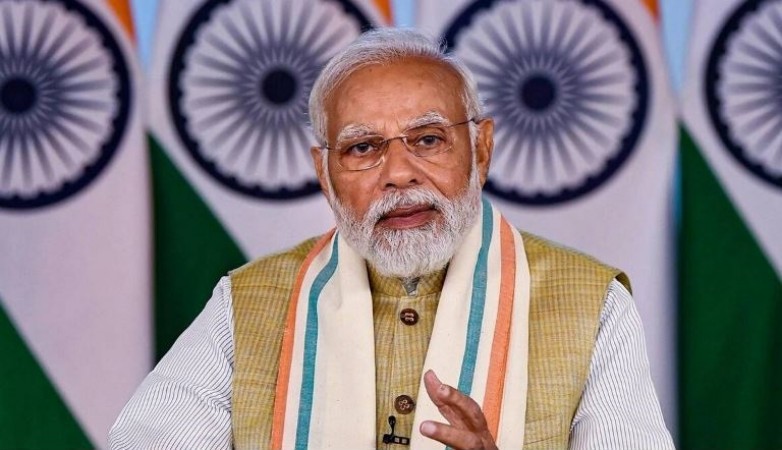
NEW DELHI: Prime Minister Narendra Modi on February 23 invited global investments in the green energy sector emphasizing India's potential in renewable energy like wind, solar and biogas is no less than a ''goldmine or oil field''. ''India will play an important role in green energy, I invite all stakeholders to invest in India,'' the Prime minister said. #NoLessthanGoldMine.
Speaking during a webinar on the Union Budget's 2023–24 announcements related to green growth, Modi said, "This budget is not just an opportunity, it also carries the guarantee of our future security." He said, India has been adding renewable energy capacity at the highest rate among large economies since 2014.
On the numerous investment opportunities in India, he said, "The potential of solar, wind, and biogas in India is no less than any gold mine or oil field for our private sector." He believed that, in addition to creating green jobs, India had a great potential to lead the world in the usage of renewable energy.
On Thursday, Modi addressed at the first of a series of 12 post-budget webinars on "Green Growth," which were held by the government to solicit thoughts and proposals for the successful execution of the objectives outlined in the Union Budget 2023. He said that every budget presented in the nation since 2014 has advanced modern changes in addition to offering answers to the problems of the present.
The Prime Minister outlined three pillars for green growth and energy transmission.
Increasing the production of renewable energy is the first step. Reducing the economy's reliance on fossil fuels is the second. And finally, the nation should quickly transition to a gas-based economy.
In the budgets of the previous few years, he emphasised policies like ethanol blending, the PM KUSUM Yojana, incentives for solar manufacturing, the rooftop solar programme, coal gasification, and battery storage. Modi emphasised programmes like green credit for industry, PM Pranam Yojna for farmers, Gobardhan Yojna for villages, automobile scrapping policy for cities, Green Hydrogen, and wetland conservation in this year's budget, underscoring the important announcements made in prior budgets.
In reference to efforts being made on a global level to diversify the energy supply chain, the prime minister stated that this Budget has provided every green energy investor a fantastic opportunity to invest in India. He noted that the entrepreneurs in the industry will find this to be of great benefit.
He also said that India's past accomplishments demonstrate the country's capacity to meet its goals for renewable energy sources well ahead of schedule.
PM said that India achieved the target of 40% contributions from non-fossil fuels in the installed electricity capacity nine years before the target date. He also noted that India exceeded its goal of blending 10% ethanol into gasoline five months earlier than expected and emphasised that the country aims to mix 20% ethanol into gasoline by 2025–2026 rather than 2030. He said that by 2030, 500 GW of total renewable energy capacity will be attained.
Remembering the debut of E20 fuel, the Prime Minister emphasised the government's attention on biofuels and remarked that it has offered new prospects for investors. He noted the large amount of agricultural waste in the nation and advised the investors to seize the chance to build ethanol facilities throughout the entire nation.
He mentioned the National Green Hydrogen Mission and how India is making progress towards its goal of producing 5 MMT of green hydrogen. Rs 19,000 crore has been set aside to encourage the private sector in this area (green hydrogen). He also discussed other possibilities, including long-distance fuel cells, the production of green steel, and electrolyzers.
The prime minister also disclosed that India has the capacity to produce 10 billion cubic metres of biogas from Gobar (cow dung) and 1.5 lakh cubic metres of gas from agricultural waste, which could make up to 8% of the nation's total city gas supply.
Due to these opportunities, the Gobardhan Yojana is currently a crucial part of India's biofuel strategy.
The government has stated that it intends to establish 500 additional plants as part of the Gobardhan Yojana in this budget. These plants are not like the ones in the past. He continued, "The government would spend Rs 10,000 crore on these cutting-edge units. The private sector is receiving alluring incentives to produce CBG from agriwaste and municipal solid waste, he said. The Prime Minister clarified India's policy on vehicle scrapping and emphasised how important it is to the country's vision for green growth.
In this year's budget, the government has allocated Rs 3,000 crore to trash 3 lakh vehicles owned by the Central and State governments that are more than 15 years old, including buses, ambulances, and police cars.
Following the maxim of Reuse, Recycle, and Recovery, the Prime Minister declared that "vehicle scrapping is going to become a large market." He also emphasised how it offers our cyclical economy new life and urged Indian young to get involved in its various branches.
In the following six to seven years, he claimed, India must raise its battery storage capacity to 125 gigawatt hours. He also said that the government has introduced a viability gap funding plan in this budget to assist battery developers in achieving significant objectives in this capital-intensive industry.
The Prime Minister also addressed the topic of water-based transportation being a significant industry in India, noting that just 5% of the country's cargo is currently transported along its coastline route, and only 2% is transported by inland waterways. He emphasised that the expansion of India's waterways will present several opportunities for all parties involved in this sector. He exhorted all parties involved to move swiftly to put each budgetary item into effect.
''The government stands with people and their suggestions,'' PM concluded.